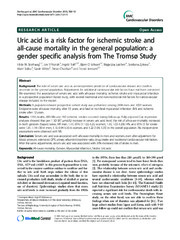Risk factors for type 2 diabetes in groups stratified according to metabolic syndrome : a 10-year follow-up of The Tromsø Study
Permanent lenke
https://hdl.handle.net/10037/3626DOI
doi: 10.1007/s10654-010-9540-7Dato
2010Type
Journal articleTidsskriftartikkel
Peer reviewed
Sammendrag
Many incident cases of type 2 diabetes do not
fulfill the metabolic syndrome, which accordingly has been questioned both as a research and clinical tool. The aim of this study was to determine differences in risk factors for type 2 diabetes between groups with high or low metabolic
score. The study population were 26,093 men and women attending the Tromsø Study in 1994, followed through 2005, and who did not have diabetes when entering the study. A total of 492 incident cases of type 2 diabetes were registered. A metabolic score was defined according to a modified version of the National Cholesterol Education Program Adult Treatment Panel III. For those fulfilling C 3 metabolic score criteria, increasing age, body mass index (BMI), triglycerides and a family history of diabetes were independent predictors. Age, BMI, and triglycerides predicted type 2 diabetes more strongly in subjects with low metabolic score, whereas high HDL cholesterol was not protective in this low risk group. The risk associated with a positive family history was unaffected by level of metabolic score. In addition smoking, low education and in men also physical inactivity were independent risk factors only in those with low metabolic score. Adding these nonmetabolic
risk factors increased correct classification from
an ROC area of 77.2 to 87.1% (P value\0.0001). One
half of the incident cases of type 2 diabetes were missed by using high metabolic score for risk prediction
Beskrivelse
This article is part of Josepha Joseph's doctoral thesis, which is available in Munin at http://hdl.handle.net/10037/2968
Forlag
SpringerSitering
European journal of epidemiology, vol. 26, number 2, 117-124Metadata
Vis full innførselSamlinger
Følgende lisensfil er knyttet til denne innførselen:
Relaterte innførsler
Viser innførsler relatert til tittel, forfatter og emneord.
-
Early markers of metabolic disease in obesity - A study of postprandial triglycerides, leptin and adiponectin interactions in the view of normal and dysregulated metabolism
Larsen, Maria Arlén (Doctoral thesis; Doktorgradsavhandling, 2019-12-06)Individuals in industrialized countries spend a substantial part of life in the non-fasting, postprandial state, which is also associated with increased oxidation and inflammation. Furthermore, a high body mass index (BMI) is the third cause of mortality in the world. In this PhD thesis, obese (BMI>30) individuals with and without metabolic disease (n=50) was included, in addition to a normal ... -
Uric acid - its role as a risk factor for the metabolic syndrome, cardiovascular and kidney disease
Storhaug, Hilde (Doctoral thesis; Doktorgradsavhandling, 2016-12-06)Uric acid as a potential risk factor for cardiovascular and renal conditions has gained renewed attention. In this work we aimed to assess the associations between serum uric acid, metabolic syndrome, hypertension, renal dysfunction, cardiovascular events and mortality. In paper I, 6083 participants from Tromsø 4 were stratified according to body mass index. Endpoints were the metabolic syndrome ... -
Effect of Angiotensin II on the Left Ventricular Function in a Near-Term Fetal Sheep with Metabolic Acidemia
Acharya, Ganesh; Huhta, James; How, Ole-Jakob (Journal article; Tidsskriftartikkel, 2011)


 English
English norsk
norsk


